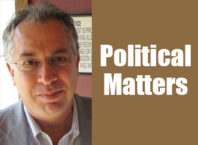By Mordecai Specktor
Remembering Marlene Whiterabbit Helgemo
I did not know the Rev. Marlene Whiterabbit Helgemo. Perhaps we spoke casually on some occasion, like a breakfast fundraiser for The Circle at All Nations Indian Church, which Helgemo, a citizen of the Ho-Chunk Nation, led for several decades.
Minnesota Public Radio reported that Helgemo was the first Native American woman ordained in the Lutheran Church. She always seemed to be smiling and welcoming everybody to her church on Bloomington Avenue. Helgemo, who passed on to the Spirit World on July 25, was the proverbial pillar of the Minneapolis Native community.
In addition to being mourned by local Indians whose lives she touched, Helgemo was remembered by national groups, including the National Congress of American Indians, which noted on Twitter that she lived “a life dedicated to serving Native communities and will be deeply missed across Indian Country”.
Muscogees vs. Black Creeks
The New Yorker magazine’s July 25 issue included Philip Deloria’s review of “We Refuse to Forget: A True Story of Black Creeks, American Identity, and Power,” by Caleb Gayle. The article begins with an account of Johnnie Mae Austin, an Oklahoma woman who, in 1979, stopped getting mail from the Muscogee Nation. The U.S. Postal Service was not to blame; rather, the stoppage was the result of a new Muscogee constitution that disenrolled Austin and other tribal members of African descent.
“The Muscogee people, also referred to as Creeks, were among the tribes that once enslaved people of African descent and that were required, in the wake of the Civil War, to accept them as tribal citizens,” Deloria writes. “A tribal-enrollment census around the start of the twentieth century split the Muscogee citizenry into groups that were separate but by no means equal. One roll – the ‘by blood’ roster – listed people of Creek heritage, while a second, ‘freedmen,’ roll named Black Creek citizens, the formerly enslaved and their descendants.”
Of course, the Muscogee tribe expelling members because of their race is not a good look. The issue of anti-Black racism, as recounted by author Gayle, also involves disenrolled members of what is called the Five Civilized Tribes: in addition to the Muscogee, the Cherokee, Choctaw, Chickasaw and Seminole brought their Black slaves out to Indian Territory, the present state of Oklahoma.
Gayle’s book presents a little known and troubling situation in Indian Country. And it’s not clear how these matters will be resolved. “Any remedy imposed by the federal government would represent a front attack on tribal sovereignty,” notes Deloria.
Visiting the Old Land of Woe
I have some Scandinavian connections (my wife, three dual-citizen sons and various in-laws), so we spent most of July in Denmark and Sweden. It’s good to leave the USA on occasion and visit societies that are more effectively and humanely governed. I’m not saying Denmark, for example, is paradise on Earth, but it’s a very relaxed vibe and they have water buses, part of the public transit system, that you can hop on and ride through the scenic harbor.
On one water bus ride, I happened to see the Red Bull-sponsored Cliff Diving warm-ups. A diving platform had been attached to the gigantic cantilevered roof of the Copenhagen Opera House and divers were performing triple flips from platforms set at 27 and 21 meters (89 and 69 feet) high.
My son Max has been living in Copenhagen for the past four years. He’s now fluent in Danish, which is not an easy language to speak; and earlier this year, he graduated from the Technical University of Denmark. I’ve likely mentioned that his tuition for the three-year program totaled zero Danish crowns (nothing), and he also received a living stipend from the government while studying, some $800+ per month. He’ll begin a master’s degree program at the end of August.
We had an Airbnb rental for a week in Copenhagen’s cool Nørrebro neighborhood, and as Max was working most days, managed to get around on public transit (buses, the automated metro and the water bus) on our own.
And we made a side trip to Berlin, spending four nights in the vibrant German capital, a city of 3.7 million people, that was once the Third Reich’s seat of power – and then divided by a wall during the Cold War.
My wife and I visited the Jewish Museum, which tells the story of the country’s Jewish community dating back to the fifth century. It’s a history full of discrimination and dispossessions, along with many accomplishments. And we pondered how the Nazi madness set Europe on fire and engineered the mass murder of six million Jews across the continent.
Amid the growing political divisions in this country, I think about the Holocaust – in Hebrew, the “Shoah,” the “cataclysm” – and wonder if it can happen again. If it can happen here.





